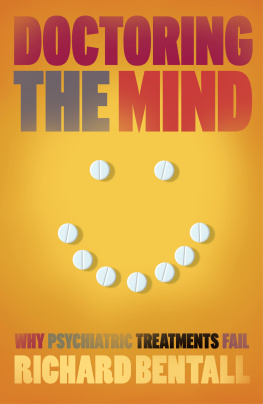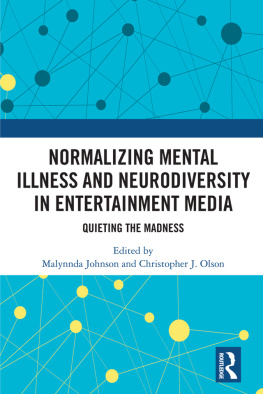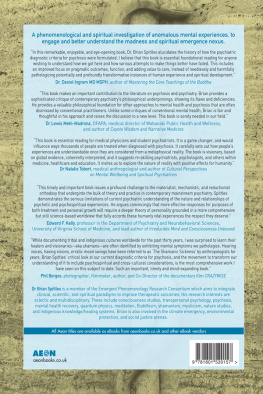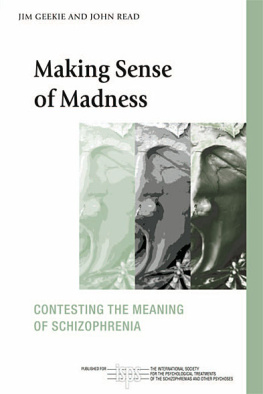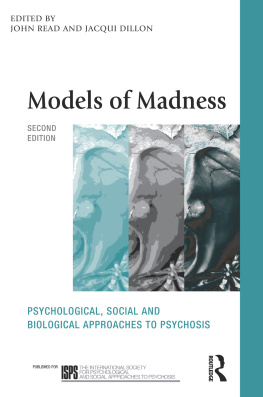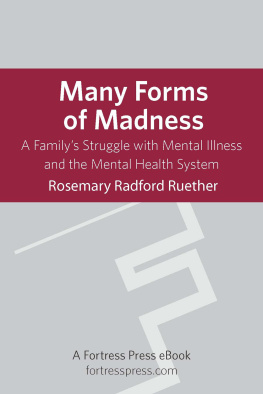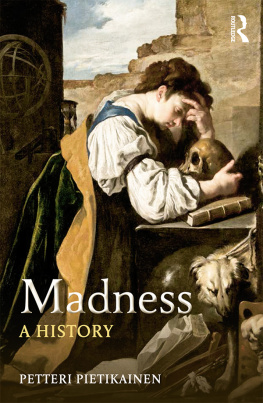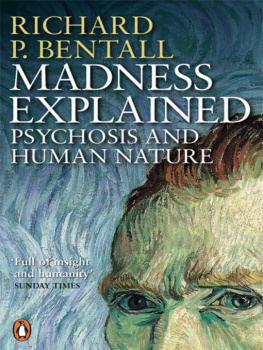Madness Explained
RICHARD BENTALL
Madness Explained
Psychosis and Human Nature
ALLEN LANE
an imprint of
PENGUIN BOOKS
ALLEN LANE
THE PENGUIN PRESS
Published by the Penguin Group
Penguin Books Ltd, 80 Strand, London WC2R 0RL, England
Penguin Putnam Inc., 375 Hudson Street, New York, New York 10014, USA
Penguin Books Australia Ltd, 250 Camberwell Road, Camberwell, Victoria 3124, Australia
Penguin Books Canada Ltd, 10 Alcorn Avenue, Toronto, Ontario, Canada M4V 3B2
Penguin Books India (P) Ltd, 11, Community Centre, Panchsheel Park, New Delhi 110 017, India
Penguin Books (NZ) Ltd, Cnr Rosedale and Airborne Roads, Albany, Auckland, New Zealand
Penguin Books (South Africa) (Pty) Ltd, 24 Sturdee Avenue, Rosebank 2196, South Africa
Penguin Books Ltd, Registered Offices: 80 Strand, London WC2R 0RL, England
www.penguin.com
First published 2003
1
Copyright Richard Bentall, 2003
The moral right of the author has been asserted
All rights reserved. Without limiting the rights under copyright
reserved above, no part of this publication may be reproduced, stored in
or introduced into a retrieval system, or transmitted, in any form or by any
means (electronic, mechanical, photocopying, recording or otherwise),
without the prior written permission of both the copyright owner
and the above publisher of this book
The Acknowledgements on page x
constitute an extension of this copyright page
ISBN: 978-0-14-190932-5
For my family
Aisling
Keeva and Fintan
Everyone is much more simply human than otherwise.
Harry Stack Sullivan,
The Interpersonal Theory of Psychiatry
Contents
1 Emil Kraepelins Big Idea
The origins of modern psychiatric theory
2 After Kraepelin
How the standard approach to psychiatric classification evolved
3 The Great Classification Crisis
How it was discovered that the standard system was scientifically meaningless
4 Fools Gold
Why psychiatric diagnoses do not work
5 The Boundaries of Madness
Why there is no boundary between sanity and madness
6 Them and Us
Modern psychiatry as a cultural system
7 The Significance of Biology
Psychosis, the brain and the concept of disease
8 Mental Life and Human Nature
Madness and the social brain
9 Madness and Emotion
Human emotions and the negative symptoms of psychosis
10 Depression and the Pathology of Self
Core psychological processes that are important in severe mental illness
11 A Colourful Malady
The psychology of mania
12 Abnormal Attitudes
The psychology of delusional beliefs
13 On the Paranoid World View
Towards a unified theory of depression, mania and paranoia
14 The Illusion of Reality
The psychology of hallucinations
15 The Language of Madness
The communication difficulties of psychotic patients
16 Things are Much More Complex than they Seem
The instability of psychosis, and the solution to the riddle of psychiatric classification
17 From the Cradletothe Clinic
Psychosis considered from a developmental perspective
18 The Trials of Life
How life experiences shape madness
19 Madness and Society
Some implications of post-Kraepelinian psychopathology
Acknowledgements
Verse
p. 118: Extract from We and They by Rudyard Kipling reproduced by permission of A. P. Watt Ltd on behalf of the National Trust for Places of Historical Interest or Natural Beauty. p. 465: Extract from This be the Verse by Philip Larkin reproduced by permission of Faber & Faber Ltd, on behalf of the estate of Philip Larkin.
Figures and tables
: Copyright Sage. Reprinted by permission of Sage Publications.
While every effort has been made to contact copyright holders, the author and publisher are happy to rectify any errors or omissions in subsequent editions.
Foreword by Professor Aaron Beck
As we move into the twenty-first century, a radical shift in the way many of us look at severe mental disorders has been taking place. Irrespective of the label whether schizophrenia, psychosis or severe mental disease a new humanizing trend is observable. In contrast to the more mechanistic framing of schizophrenia in terms of abnormal brain chemistry or anatomical lesions, the new approach views the patient as a whole person troubled by apparently baffling problems, but also having the resources for ameliorating these problems. This New Look can be contrasted with the prevailing biological paradigm with its emphasis on the disordered neurochemistry and anatomical defects and especially the perception of the patient as a passive recipient of the treatment. Although the laboratory tests, brain scans, and post-mortem studies have advanced our understanding of the neurological substrate and provided a variety of new medications, the distancing of the mental patient from the rest of humanity has persisted.
The more recent work spearheaded by Richard Bentall has brought the patient back into the mainstream of humanity. He and his co-workers have been able to demonstrate that the apparently mysterious, incomprehensible symptoms of the mentally ill are actually extensions of what many of us experience every day. The rather arcane extreme beliefs manifested by the patients can be seen to be on a continuum with ideas of the population at large. Beliefs in mind-reading, clairvoyance and alien possession are especially common in young people and a surprisingly large percentage of the population believe that they have received communications from God, the Devil and aliens. The bizarre thinking of the severely disturbed patient represents an extract of these common notions. These beliefs, however, become a problem when they come to dominate the patients thinking and especially their interpretations of their experiences. By analysing these beliefs within the framework of human nature and mainstream psychology, we can begin to make sense out of them. Further, the so-called negative symptoms can be understood as a natural detachment from a stressful environment. By disengaging, the patients attempt to shut out those stimuli that activate their delusions and hallucinations. Part of the withdrawal also represents a giving up produced by the profound demoralization over others having given up on them.
Concurrent with the ground-breaking work of Bentall and his team, there has been an upsurge of interest in cognitive therapy of schizophrenia, with a number of successful attempts to ameliorate the patients psychotic symptoms already published. The new approach, inspired in part by Bentalls work, views patients as agents in their own change, rather than passive recipients of the treatments that are administered to them. Further, the normalizing rationale derived from Bentalls formulations provides a basic construct by which patients can understand and cope with their distressing, unusual experiences.
As the leader in the investigations of the psychology of psychosis, Bentall is uniquely qualified to explain this new approach and make it available not only to readers of scholarly journals, but also to a much broader audience. His approach demystifies psychosis and restores the patient to a proper place with the rest of humankind. By reversing the dehumanizing trend, he makes it possible to relate to the afflicted individuals as though they are just like the rest of us, although ostensibly quite different. The book is of particular interest to anybody who is curious about human nature and its vicissitudes. It will be of a special interest to those individuals who suffer from these mental disturbances or are related to such individuals or are professionals who treat them.
Next page

